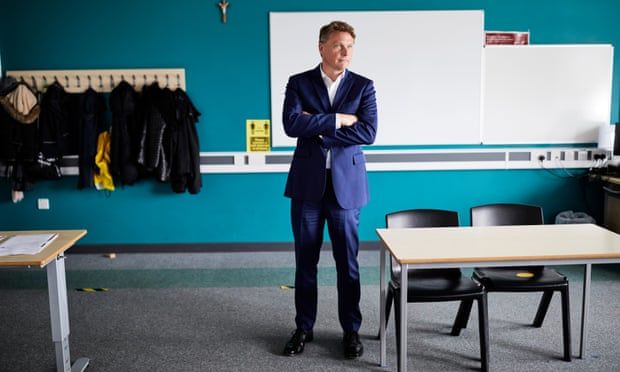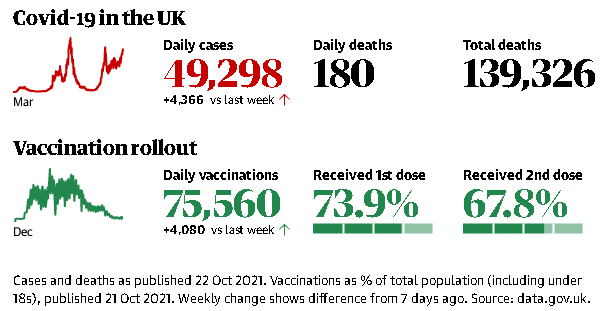
English schools struggle to cope as Covid wreaks havoc
Schools in England hit by high numbers of Covid-19 cases among staff and pupils have been forced to reinstate mask wearing, send whole year groups home to study online and in some cases close early for half-term as the pandemic continues to wreak havoc in education.
Despite the government narrative of a return to normality in classrooms, schools in areas with high coronavirus rates say they have struggled to function, with many staff off sick and problems securing supply teachers because of high demand.
This week, for example, one Devon school was missing a third of its workforce, a school in Wiltshire was forced to send two year groups home early for half-term and a Buckinghamshire junior school closed and moved to online learning. In Northamptonshire, meanwhile, the Guardian has learned that one primary school had almost 50% of pupils off with Covid during a period of about a week between the end of September and 5 October.
The school has since introduced key stage bubbles and restrictions to social contacts and external visitors, but according to unions there have been delays in many areas across the country in introducing mitigating measures because of a lack of clear advice.
Julie McCulloch, director of policy at the Association of School and College Leaders (ASCL), said local public health officials had the option within the government’s guidance to introduce enhanced measures in schools to tackle infection rates. She said: “Some have already done this, but many schools and colleges are struggling to get clear advice when they have an outbreak and feel they are, yet again, being left to manage a public health crisis with insufficient support.”
In a recent ASCL survey more than 90% of headteachers said teaching and learning had been impacted by pupil and staff absence this term and almost a third said the impact had been severe, while four out of five had been targeted by anti-vaccination campaigners. In one case a pupil was pushed into the road by a protester after refusing to take a leaflet. “The anti-vax movement is more prolific and louder than scientific or NHS argument,” said one headteacher with a 35% consent rate.
 Ben Davis: ‘Schools have been thrown into this with no measures or restrictions and we’ve been told to deal with it.’
Ben Davis: ‘Schools have been thrown into this with no measures or restrictions and we’ve been told to deal with it.’
“People are on their knees,” said Ben Davis, headteacher at St Ambrose Barlow RC high school in Wardley, Greater Manchester. “There’s never been such a hard half-term as this, during the whole pandemic. Schools have been thrown into this with no measures or restrictions and we’ve been told to deal with it.”
Covid rates have been higher in his school than before, with 80 positive cases and up to 14 staff off at a time. “We’ve reinstated masks in corridors and classrooms on the advice of public health. Achieving cooperation with that is much, much harder than it was as there’s nowhere else in their lives that children are having to wear masks.”
In Cornwall it has been similarly challenging. “We have had school closures and several year group closures across primary and secondary, with a couple having to close early for half-term due to staffing pressures,” said David Barton, executive officer of the Cornwall Association of Secondary School Headteachers. “Our Covid rates have remained high since the summer and are increasing – currently 555 per 100,000 – and half of all cases are in school-aged children.”
The government’s vaccination rollout for 12- to 15-year-olds is fraught with problems. Take-up among Cornish pupils is higher than the national average, said Barton, “but capacity to roll out the immunisation at pace simply isn’t there so less than half our schools have so far had any immunisations.”
Elsewhere local authorities have been accused by unions of failing to support schools to take steps to mitigate high case numbers. While Cambridgeshire has taken action in schools to bring back masks in communal spaces, social distancing for staff and online meetings where possible, the situation has played out very differently in other parts of the country, including Northamptonshire – an area where case rates are among the highest in England at just over 642 cases per 100,000 people in the most recent seven days for which data is available.

Rachelle Wilkins, the regional officer for the GMB union in Northamptonshire, said: “I’ve been visiting schools in the last four or five weeks. And it’s been basically a free-for-all. I’ve been into a school this morning and worn a face mask in a meeting – nobody else had a face mask on.”
On 11 October a letter from six trade unions, including the GMB, was sent to local authority chief executives and directors of public health across England, asking for urgent steps to be taken to help keep pupils safe in schools. Wilkins said the North Northamptonshire unitary council had moved to reintroduce face masks in schools, though headteachers will be able to use their discretion.
Lucy Wightman, joint director of public health at North and West Northamptonshire councils, said schools had been following DfE guidance since the start of the new school year and are being supported by the council’s team.
“Directors of public health do not have the authority to override the DfE guidance in place,” she said. “We are only able to offer advice to schools. Headteachers have to take the final decision themselves.”
Wightman said a letter was sent on Friday to parents via schools. “This provides advice for during half-term and on return to school. The letter includes the ask that pupils adhere to any requests made by headteachers for the use of face coverings where infection risks are identified and/or outbreaks occur, and that parents support this,” she said.
A Guardian callout to readers prompted dozens of responses from anxious teachers and parents. “All the hand sanitising dispensers are empty and everyone is acting as if there is no pandemic at all,” said one secondary teacher. “Our school has seen more upheaval than when we were closing for bubbles,” said another. “One class had 30% positive cases this week. Parents are demanding online learning for their sick children but we are on our knees just trying to keep classes running.”
“It’s genuinely very varied across contexts and locations,” said Robin Bevan, headteacher of Southend high school for boys. “Case numbers are rising, which is noticeable in pupil absence levels, and challenging for sustaining remote and on-site learning, but not yet at a level that disrupts significantly.
“There is a lurking background fear that it will get worse and that there isn’t really a plan. We do seem to have been left to get on with it. The reservoirs of resilience are running dry.”
Jules White, headteacher of Tanbridge House school in Horsham, West Sussex, said there had been about 200 student infections to date in his school. “The pressures of supporting students who continue to have their learning disrupted are significant especially when colleagues are also having periods of isolation that last 10 days.”
Confidence in the government is wearing thin. “In the middle of the pandemic the government said all children’s schooling was their ‘first priority’,” said White. “I will believe that if we see substantial investment in education after the upcoming comprehensive spending review.”
A Department for Education spokesperson responded: “The protective measures in place in schools strike a balance between managing transmission risk – with enhanced ventilation, regular Covid testing and vaccinations of older students and staff – and reducing disruption to education by removing the need for close contacts in bubbles to self-isolate and for face coverings to be worn in most cases.
“If there are particularly high Covid case rates in schools or colleges in their local area, local directors of public health may advise they reintroduce temporary additional measures such as increased testing, but face-to-face education should be prioritised.”











